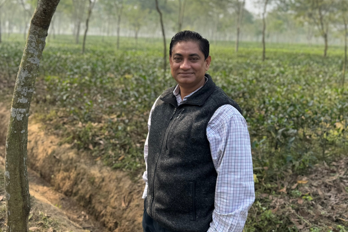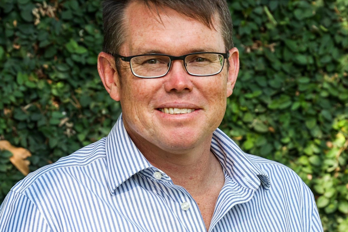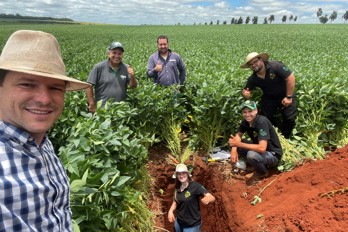In 1985, Camellia acquired Maruque Farm, Sao Paulo, Brazil. A farm of some 3,765 hectares producing bi-annual crops of soya, wheat, maize, sorghum, oats and beans. Maruque Farm is a highly technical operation, we use a range of technologies and regenerative practises to manage our crops as efficiently as possible.
We spoke with Alex Geovani Bruch, General Manager at CC Lawrie Brazil about the farming process.

Sowing the seeds
At Maruque Farm in Brazil, we make plenty of use out of our fields by growing crops all year round. Two crops are grown in the same field each year, a summer crop and a winter crop.
During the summer months most of the area is sown with Soya, because this is the crop with the best adaptability, higher profit margins and demand. The soya is planted between September to October and is ready for harvesting in February.
In the winter months, we need to schedule the crops to minimize the risks during the winter i.e. frost, drought, hail, etc. Therefore, we divide the area and we plant part with maize, sorghum in February ready for an August harvest. Later, we plant wheat and white oats in April, which we’ll harvest in September.
The farm also works with three different production systems, rotating the crops to ensure soil health and the best quality produce.
In the winter months, we need to schedule the crops to minimize the risks during the winter i.e. frost, drought, hail, etc. Therefore, we divide the area and we plant part with maize, sorghum in February ready for an August harvest. Later, we plant wheat and white oats in April, which we’ll harvest in September.
The farm also works with three different production systems, rotating the crops to ensure soil health and the best quality produce.

Crop care
Producing high quality crops is essential to our business. We use sustainable agricultural practises to promote the best health of our soil and crops.
Here are some of the practises we use at our arable farm in Brazil:

For soil health we use several practises such as, zero tillage planting, pH correction, crop rotation, organic fertilizers, biological insecticides and fungicides. Cover crops and soil de-compaction methods avoid erosion and rejuvenate the soil.
We also use ‘Precision Agriculture’ technology, using drones, to make maps of the fertility of the soil in each plot of land and makes it possible to add right amount of nutrients in each part of the area.
Pest control, we use IPM technology (Integrated Pests Management). This technology identifies the type and the amount of the pests in the area so that we can treat accordingly with the right amount of biological, chemical or cultural controls.
Efficient irrigation is vital! We have a lot of crops to water so we need to irrigate as efficiently as we can. We use a system that takes into consideration each type of crop, each stage the crop is in and each environment it is in for decision making. Every 15 days the soil moisture is measured and the system is checked, gauged and calibrated. An external company helps us with all of this.
We have a trained team focused on irrigation. Whenever possible, we irrigate only during the night, when we have the most efficient use of water and the lowest energy cost.

Harvest time
Harvesting is the most rewarding part of our farming. All the hard work, dedication, knowledge, patience, and discipline of our farmers is paid off in the form of high quality food produce.
Each crop has an ideal harvest time which we measure by the amount of moisture in the grains. For the most part we start harvesting when the moisture in the grains is less than 20%, except for maize, which we start harvesting when it is below 30%. The ideal moisture to store the grains in the silo is around 13 - 14%.
At our farm in Brazil, we can harvest 120 Ha of soya in a day. This requires six GPS driven harvesters and around 18 employees!
Once the crops have been harvested, they are stored on the silos. Maruque Farm produces a total of 38,500 tonnes of produce.

Environmental impact
As part of the Camellia Group we seek to protect the environment and minimising our environmental footprint. Our agriculture practises are designed to work with the natural environment and to keep carbon emissions as low as we can.
In the crop rotation system that we use, the winter crops benefit from nitrogen left by the soya. No Nitrogen chemical fertilizer is necessary, which makes soya extremely viable and is of great importance in the agriculture of low carbon emissions.
The Soya in sequence of grasses is also benefited by the straw left over from the previous crops. The winter crops help the utilization of different types of herbicides in this way rotating the mechanism of their action, avoiding emergence of new weeds with resistance to certain herbicides. Crops used as cover crops, decompress the soil, increase organic matter, reduce pests such as soil nematodes, renew nutrients, among others.

In our journey to become self-sufficient we have invested in two solar stations on Maruque Farm in Brazil. One is responsible for supplying all the energy needed for the silos, the administrative headquarters and one of the irrigation pivots on the farm. The second station supplies energy to the entire village of the farm's residents.
We are in the process of installing three more units where we will soon seek to be self-sufficient in energy production and totally clean.





